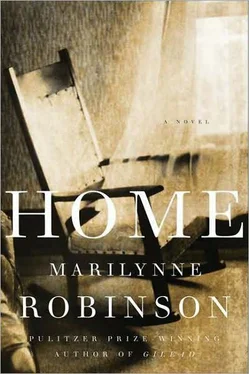OVER THE NEXT FEW DAYS THREE MORE LETTERS CAME back. She made careful fires of small kindling in the fireplace and tended them until each of the letters was burned to ashes. Jack saw her kneeling there, Jack who had taken to wearing his suit again, jacket open and tie loose to acknowledge the late-summer heat. He watched from the door, smiled and nodded to her, and stepped away when she tried to speak to him. There was still courtesy, taken back to what was for him its essence, the dread and certainty of being unwelcome, a bother, out of place. He had fallen back on estrangement, his oldest habit. As if he knew his unease made him seem aloof, he left the house in the morning and stayed away until evening, too late for supper but in time to spare his father his darkest fears. She left biscuits on the counter with the thought that he might pocket a few of them, and he did. She set out oatmeal cookies and hard-boiled eggs. She left coffee for him in a thermos bottle and a cup beside it, which he washed and put away. While he was gone she was very careful to see to everything he might have helped her with, so that he would not have to choose between the embarrassment of imposing on her and the forced familiarity of her company. And she prayed for him and prayed for him, she and her father, in long, silent graces that were grateful in anticipation of their relief at hearing him come through the door.
At supper the third night her father said, “I don’t know what it is, Glory. I don’t know what has happened.”
She said, “He is in love with a woman he knew in St. Louis.”
“Well, I figured out that much. All those letters.”
“Yes. The last week she’s been returning his letters.”
“Oh.” He took off his glasses and blotted his face with his napkin. After a moment he said gruffly, “I thought that might happen. Something like that. He doesn’t have a job. I don’t believe he ever graduated from college. He’s not a young man, not likely to change his life, and I don’t think it’s been a very good life. I can see why a woman might—” He cleared his throat. “Well, I can’t say I’m surprised.”
“He’s known her for years. Those ten good years he talks about. He says she has helped him.”
Her father looked at her. “And they were never married at all?”
“I don’t know,” she said. Her father looked somber. A failed lie meant his suspicions were correct, and she had probably never lied to him successfully. In fact, lying in that family almost always meant only that the liar would appreciate discretion. So the transparency of a falsehood was very much to the point. She had cordoned off her own embarrassments from inquiry by means of a few explanations that were false on their face and never tested or returned to for that reason. As a matter of courtesy they treated one another’s deceptions like truth, which was a different thing from deceiving or being deceived. In fact, it was a great part of the fabric of mutual understanding that made their family close.
She told some truth in this case because she was offended for Jack’s sake by the suggestion that he had simply thrown himself at a woman and been rejected, as if he were not ruefully aware as anyone could be of his utter ineligibility. It must have been this Della who kept him safe despite everything they feared, who may have kept him alive, and in any case who had made the world a tolerable place for him for a while, as they had somehow never managed to do. Jack had said that he worried about the casting of aspersions on Della and on their relationship, told her about trying to defend her honor, and Glory knew even as she did it that she should not have mentioned those ten years. Still, Jack should not be made to seem like a fool. And Della, whoever she was, had not reckoned his worth in terms of his prospects, for heaven’s sake. That much had to be said for her.
She knew she had made a grave mistake in giving her father’s anxieties some grounding in fact. She said, “The woman is a minister’s daughter.”
Her father nodded. “And Jack is a minister’s son.” Then he said, “There are no children involved.” This was a statement of the kind that meant he did not want his hope contradicted.
“No,” she said. From time to time she had wondered, too.
His face settled into that grave look it took on when he felt some sort of moral intervention was required of him. It was a sad, even a bitter look, because only the lack or failure of other approaches could induce him to fall back on this one, and because he knew it had never yielded any wholly good result. It might be that Jack had obligations he could not meet. If he did, then the family must act on behalf of those to whom he was obligated. Especially since they were no doubt also family. The old man would have to know what he was dealing with here, even though Jack was sure to be offended. His questions would inevitably sound like accusation. Such misery, just to learn what he did not want to know.
IF JACK HAD MARRIED THAT FRECKLED CHILD, OR AT LEAST if they had managed to bring her and her baby into their household, then he could have gone back to college and the girl could have finished school and gone to college herself, if she wanted to. “She seems bright enough,” Glory’s mother had said. That was her interpretation of the precocious, intractable hostility toward the Boughtons that would not be moved or swayed by any kindness they could contrive. She was a hard, proud, unsmiling girl, and she may well have hated them all for their benevolent intentions, which were indeed condescending, reflecting as they did their awareness that her circumstances could be improved, that she might benefit from being gently instructed in the proper care of an infant even though this would involve overruling her mother.
Once, Glory had talked that freckled child into coming to her house to pick apples, she said, and bake a pie. Annie was her name. Annie Wheeler. She came out to the gate dressed the way schoolgirls dressed on Saturdays, in dungarees and an oversized shirt. She carried the baby on her hip. They sailed off to Gilead, the girl acknowledging no pleasure at all at having the top down on a bright afternoon, or at stopping for ice cream cones to eat as they drove. The baby gummed at the ice cream and put her hand in it, and her mother said, “Now look at you!” and licked a smear of ice cream off the baby’s chin and the palm of the baby’s hand.
It was all Glory’s idea. Her parents were gone for the day to a wedding in Tabor. She had not spoken to them about her plan. She drove very carefully.
They went out to the orchard, and the girl stood silently with the baby on her hip and watched Glory pick apples. When she said she had picked enough for the pie but would pick a few more for the girl to take home, she said, “We got apples.” Well, of course they would have them. There were apple trees everywhere anyone had ever thought to plant them, like lilac bushes and gooseberries and forsythia and rhubarb. She and the girl went into the house and set the baby in the sunlight on the kitchen floor. Her mother gave her a toy she pulled out of her pocket, buttons on a string, and said, “At home she’s got a milk bottle.” So Glory decanted a pint of cream into a drinking glass and rinsed it out and put it on the floor by the baby’s knee. The girl knelt beside her and poured the buttons from her hand into the bottle, then out again, and the baby laughed and did awkward and purposeful things for a while with her toys, and Glory started to make pastry, talking aloud as if to remind herself of the fine points of the process, the need for careful measurement. The girl sat at the table, sipping a root beer.
Then the baby’s back began to round with the weight of her head, and she pitched over on her side and began to kick and fuss. Glory said, “Oh, poor thing!” and took her up and swayed with her and kissed her teary cheek. And the baby struggled and wept and yearned away from her with a weight and strength that surprised her, holding out her arms to her mother. The girl took her and settled her on her hip, and the baby leaned her head against her shoulder, sucked her hand, and drew her breath in gasps of relief. “You just ain’t her mama,” the girl said. “No use crying about it.” She never gave any sign that Glory’s efforts at befriending her were more than an irritation till that morning when she called her and said, “I wish you’d come over to my house. My baby’s got something the matter with her.” She had walked three miles down the road to ask the use of a telephone.
Читать дальше












